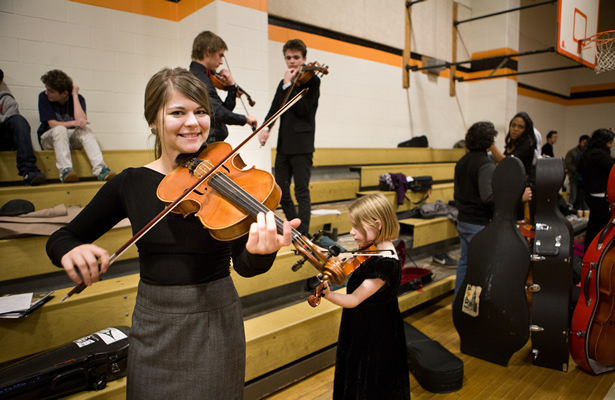This article is part of the Community MusicWorks “View from a Fellowship” monthly series. Ms. Boerner is a cellist and first-year CMW fellow.

I often wonder if the experience of painting would turn into a relentless grind if I were trying to be a professional painter. When I paint, there’s no pressure. It’s not difficult for me to achieve “flow,” that mysterious and wonderful sensation of being in the zone. It’s easy for me to lose track of how much time has passed and how much coffee I’ve put away. However, when I’m practicing, as soon as I look up from the instrument I’m glued to the clock. All bets are off as far as that flow stuff goes.
I should mention, though, that CMW’s Fellowship has a brilliant feature: the Practice Retreat. You choose a week that doesn’t look too pivotal, choose a project that involves spending some quality time with your instrument, and submit a proposal outlining the plan. If it’s approved, then voilà! CMW pays for a sub and you have the week off to pretend like you’re back in music school.
One of my projects for the Retreat week included spending time on excerpts for a rapidly approaching audition. Since this is the first year that I’ve been out of school and in the workforce, my practicing has been subject to an entirely new set of forces and influences. I was happy to have a window of free-form practice time on Friday to work however and however long I pleased, instead of my normal heavy-on-the-staff-meeting routine.
The first part of the day was perfectly normal. I warmed up slowly. I worked on some well-known trouble spots. A few hours elapsed, and I stood in front of my iPhone and recorded the audition material. I had successfully completed my routine. What came next was the surprise.
I sat down to my laptop to take a break, when I realized that I wanted to keep playing. This was odd. It wasn’t that the mounting audition pressure was driving my viola back into my arms. It wasn’t that I felt “out of shape” and hoped a few more scales would fix me. I just wanted to hang out with my instrument.
In this moment, I wanted to play the viola in the same way I always want to paint.
Don’t get me wrong: I am stunned by the wonderful things that classical music has brought to my life. I think this career has tremendous peaks to complement its necessary valleys. But, it is my job. There are deadlines. There are great projects and not-so-great projects. There is constant back-of-the-mind practice guilt. I usually get the job done to the best of my ability, and then take a break from the instrument. (And I should clarify that as often as not, “taking a break” means teaching or going to meetings – anything that isn’t strictly practice time.)
But Friday was different. When I realized that I wasn’t finished on the viola, I pulled out a copy of the Franck Sonata and I just played. I let myself enjoy my capacity. I let my mistakes go. I lost track of time because I was wrapped up in the act of (re)creation.
Before and after the Practice Retreat, I did and probably will feel too busy to devote time to the kind of playing that doesn’t have a deadline. But during Retreat week, my job was to take a break from a couple of those deadlines and just be a musician. It was exciting and freeing to play some viola just for kicks. I plan to hold onto that feeling, the feeling I get when I paint, so I don’t forget to search for that freedom on the viola as reality resumes.
Community MusicWorks is a community-based music performance and education program that provides free violin, viola, and cello lessons for students who live in the West side neighborhoods of Providence, RI. Its structure, as a storefront residency for professional musicians in an urban neighborhood, has become a new model of successful urban arts education over the past fifteen years. CMW’s Founder and Artistic Director, Sebastian Ruth, was a recipient of a MacArthur Foundation fellowship in 2010 for his work “forging a new, multifaceted role beyond the concert hall for the twenty-first-century musician.” Community MusicWorks offers four two-year positions to young professional musicians looking to gain a deeper understanding of the CMW model.














No comments yet.